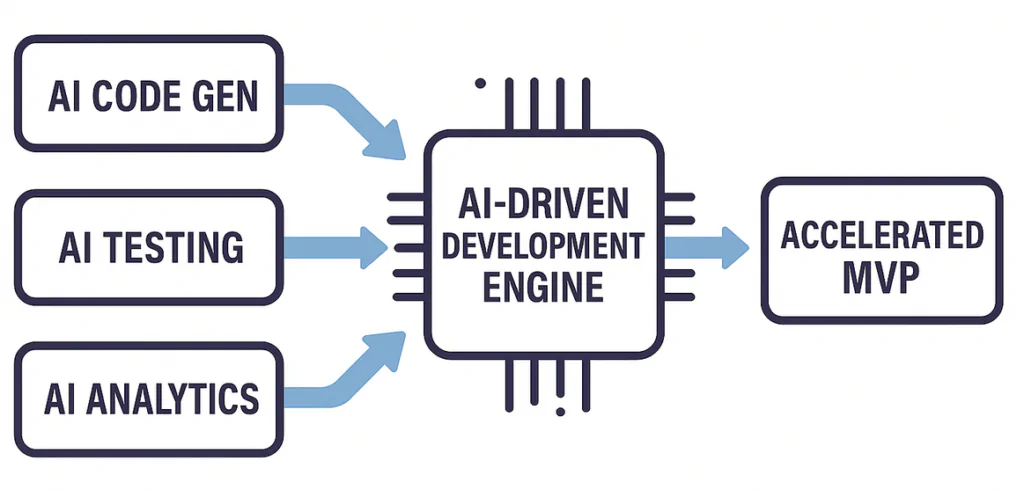Bringing a new software product to life starts with validating the core idea. The Minimum Viable Product (MVP) is the established method – a streamlined version built quickly to test the waters and gather user feedback. However, traditional software development timelines, often stretching from 3 to 6 months or longer, can feel painfully slow. In competitive industries, this delay means potentially missed opportunities and escalating costs that strain budgets, particularly for startups and SMEs. This drawn-out process can hinder agility and innovation.
Enter the game-changer: AI-driven development. By integrating Artificial Intelligence and automation into the software development lifecycle, companies are smashing traditional timelines. Imagine launching your MVP not in months, but in mere weeks. Picture achieving this speed while also reducing the financial outlay typically associated with bespoke software development. This isn’t science fiction; it’s the practical application of AI tools, and its growing significance is reflected in rising public and developer interest. The chart below illustrates this trend, showing the relative search interest for “no code” versus “low code” development from 2020 onwards, based on Google Trends data. Notice the particularly sharp acceleration in interest for “no code” solutions in recent years, a trend potentially fuelled by AI advancements making these platforms more powerful and accessible for rapid application building:
Rising Search Interest: No Code vs. Low Code Development
No code tools (such as N8N) heavily promote the use of AI workflows to accellerate development. This surging interest underscores the increasing adoption and perceived value of these AI-enhanced approaches, which promise faster, more efficient software development. These advancements deliver tangible ROI and accelerate your path to market validation. Adopting AI automation is becoming a strategic imperative for efficient, modern software development.
Related Read: How Much Does AI Software Cost?
TL;DR: Key Takeaway Points
AI automation turbocharges MVP development by drastically cutting timelines (often by 50%), lowering costs through efficiency gains, improving initial software quality, and enabling faster, data-driven iteration. This is key for businesses needing agile, cost-effective software development.
For time-pressed decision-makers, here’s the essence presented clearly:
| Benefit | Description | Impact on Business |
| Unmatched Speed | AI significantly shortens MVP launch times (reports suggest up to 50% reduction), turning months into weeks. | Faster market entry, quicker validation, competitive advantage |
| Cost Efficiencies | Automating tasks reduces developer hours, lowering the cost of bespoke software development. | Improved ROI, better budget allocation, makes innovation accessible |
| Enhanced Quality | AI tools contribute to more stable, polished MVPs with fewer bugs from the start. | Increased credibility, reduced rework, better user experience |
| Accelerated Learning | AI rapidly analyses user feedback and behaviour, providing actionable insights quickly. | Faster product iteration, data-driven decisions, agility |
| Strategic Focus | AI handles routine work, freeing expert developers for innovation and complex bespoke software logic. | Greater differentiation, higher value output from talent |
| Accessible Tech | Many AI tools integrate with standard software development workflows, empowering existing teams without needing specialist hires. | Lower barrier to adoption, faster implementation |
How AI-Driven Development Accelerates MVP Software Implementation

What is AI Automation in Modern Software Development?
AI automation in software development refers to using intelligent tools and platforms to perform or significantly assist with tasks traditionally requiring manual human effort. Within MVP creation, this means employing AI for faster coding, smarter testing, insightful data analysis, and streamlined project management to build prototypes efficiently.
Think of AI automation not as replacing your team, but as equipping them with powerful co-pilots and digital assistants specifically designed to enhance the software development process. The objective, especially for an MVP, is to maximise speed and cost-effectiveness while validating a core business concept. Instead of developers meticulously writing every line of common code or testers manually executing repetitive checks, AI steps in to handle these burdensome tasks.
These AI systems leverage sophisticated techniques like machine learning and natural language processing, having been trained on enormous datasets comprising code, test results, and user interactions. They intelligently assist with or fully automate parts of the software development workflow. This strategic application empowers your valuable team – your architects, developers, and product managers – to concentrate their expertise on the unique, high-impact features of your bespoke software solution, rather than getting bogged down in commodity tasks. It’s fundamentally about using technology to amplify human capability and accelerate innovation.
What Key AI Technologies Power Faster MVPs?
Several AI technologies are pivotal in accelerating MVP builds, notably AI-assisted code generation, intelligent test automation frameworks, and advanced AI-powered data analytics platforms. These tools work synergistically across the software development lifecycle to compress timelines and enhance efficiency.

The most impactful AI applications in AI-driven development for MVPs include:
| AI Technology Area | Description & Examples | Key Benefit for MVP Speed |
| AI Code Assistance | Tools (GitHub Copilot, Tabnine) integrate into IDEs, suggesting code snippets or entire functions. Excels at generating boilerplate code. | Reduces manual coding time significantly (up to 20-55% faster). Accelerates foundational development. |
| Intelligent Test Automation | Platforms (Testim, Mabl) use AI to auto-generate tests, adapt to UI changes (‘self-healing’), and prioritise testing based on risk. | Dramatically speeds up testing cycles, provides faster feedback, reduces manual test maintenance, improves quality assurance. |
| AI Data/Feedback Analysis | Utilises NLP and ML to rapidly analyse user comments (identifying sentiment, themes) and usage data (spotting patterns, issues). Examples: AI features in Mixpanel, Amplitude, Zonka Feedback. | Transforms raw data into actionable insights in hours instead of days/weeks, enabling rapid, data-driven iteration. |
| AI-Enhanced Project Management | Emerging tools (Jira AI, Asana Intelligence) assist with predictive scheduling, resource allocation suggestions, and automated status tracking. | Streamlines project coordination, reduces administrative overhead, helps maintain momentum in rapid development cycles. |
How Do AI-Enhanced Timelines Compare in Software Development?
AI-driven development methodologies frequently enable MVP delivery in roughly half the time compared to conventional software development practices. Observed timelines often shrink from a typical 4-6 month cycle to a more agile 2-3 months, offering a significant strategic advantage.
This acceleration represents a fundamental shift in software development velocity. The comparison below highlights the stark differences and the resulting business impact:
| Aspect | Traditional Software Development | AI-Driven Development (MVP Focus) | Business Advantage Summary |
| MVP Timeline | 4 – 6+ Months | ~2 – 3 Months | Faster market validation & path to revenue/funding. |
| Coding Effort | Manual creation, high boilerplate load | AI assists, reduces repetitive coding. | Lower dev costs, better use of expert developer time. |
| Testing Cycle | Often manual, slower feedback loops. | Automated, continuous, rapid feedback. | Higher quality MVP, faster bug fixes, reduced risk. |
| Learning Speed | Manual data analysis (days/weeks). | AI analysis provides insights in hours. | Rapid product iteration & adaptation to market needs. |
| Team Focus | Significant time on routine tasks. | More time on innovation & bespoke logic. | Greater product differentiation & value delivery. |
This dramatically compressed timeframe empowers businesses to test ideas, gather crucial market intelligence, and make informed decisions about further investment or strategic pivots much more rapidly, significantly de-risking new bespoke software ventures.

Why Adopt AI Automation for Your Bespoke Software MVP?
Integrating AI automation into your MVP strategy yields compelling business outcomes: unmatched speed, significant cost savings, improved initial quality, and accelerated learning. For companies investing in bespoke software development, AI offers a smarter, more efficient path to validation and achieving positive ROI.
The rationale for embracing AI-driven development extends far beyond technical novelty; it’s fundamentally about smarter business execution and gaining a competitive edge. It directly addresses the core pressures inherent in launching new software: the non-negotiable need for speed, rigorous cost control, and achieving market fit quickly and effectively.
Why is Speed the New Currency in Software Development?
Rapid MVP deployment allows you to seize market opportunities, gain first-mover advantages, and iterate based on real user data before competitors can react. AI-driven development delivers this critical velocity by fundamentally compressing traditional software development timelines.
In industries undergoing rapid digital transformation – whether it’s fintech, health tech, e-commerce, logistics, or energy solutions – timing is often the critical factor differentiating success from failure. Getting your bespoke software solution, even in its initial MVP form, into the hands of users quickly provides numerous strategic advantages. This includes capturing early market share, building essential customer relationships, and iterating based on tangible feedback while competitors may still be in the planning or building phases. AI achieves this acceleration by automating bottlenecks across the development lifecycle. With potential development time reductions reaching up to 50%, AI enables a cadence of innovation and market response previously unattainable, allowing you to learn and adapt at the speed the market demands.
How Does AI Deliver Tangible Cost Reductions and Boost ROI?
AI automation directly cuts the costs associated with bespoke software development by minimising the dependency on costly, manual developer and tester hours. This improves project affordability, optimises budget allocation, and shortens the time required to achieve a positive return on investment.
Expert software development talent represents a significant investment for any business. AI helps optimise this investment through several mechanisms: reducing the sheer volume of manual labour required for coding standard components and executing tests; enabling smaller, highly productive teams augmented by AI to achieve the output of larger traditional groups; leveraging AI-powered low-code/no-code tools (a market projected to involve 70% of new apps by 2025) to democratise certain development tasks; and preventing expensive rework by catching bugs much earlier through automated AI testing. These combined efficiencies make ambitious bespoke software projects more financially viable and free up capital that can be strategically redeployed into other crucial business activities like marketing, sales, or further R&D, ultimately strengthening the venture’s overall financial performance and accelerating its path to profitability.
How Can AI Simultaneously Accelerate and Enhance MVP Quality?
AI tools can improve the baseline quality and stability of an MVP, even when built quickly. By enforcing coding standards through suggestions, enabling vastly more comprehensive testing regimes than manual methods allow, and flagging potential issues early, AI contributes to a more robust and reliable initial product release.
It might seem counterintuitive, but the speed gained through AI-driven development does not necessarily come at the expense of quality; in many cases, it can enhance it. AI code assistants often generate code adhering to established patterns and best practices, potentially reducing human errors and promoting consistency. AI-powered testing platforms can execute thousands of tests across diverse scenarios, achieving a level of coverage impractical for manual testing within tight MVP timelines. Furthermore, the immediate feedback provided by continuous AI testing allows developers to fix defects while the context is fresh, preventing bugs from accumulating. Industry reports confirm AI improves overall software quality and reliability. When developers are more productive (with over 80% reporting gains from AI tools) and less burdened by tedious tasks, they can apply more focus to building quality into the core features, leading to a more polished and stable MVP.


Discuss Your Project Today
How Does AI Practically Reshape the Software Development Workflow?
AI integrates strategically across the software development lifecycle: accelerating coding, automating testing cycles, rapidly deriving insights from data, and optimising project management. This holistic impact results in significant end-to-end efficiency gains for bespoke software MVP projects.
The acceleration achieved through AI-driven development stems from tangible, practical applications at various critical stages of building and iterating on your MVP:
| Workflow Stage | How AI Accelerates | Impact on Bespoke Software MVP |
| Code Generation | Automates boilerplate code, provides intelligent autocompletions (GitHub Copilot etc.). Frees developers from routine tasks. | Faster implementation of foundational elements. More developer time focused on unique, high-value custom software logic. |
| Testing & QA | Automates test creation, execution (‘self-healing’ tests via Testim, Mabl etc.), and prioritisation. Enables continuous testing. | Drastically shorter feedback loops, earlier bug detection, higher confidence in releases, reduced QA bottlenecks. |
| User Feedback Analysis | Uses NLP (Zonka Feedback etc.) & ML to rapidly process text comments and usage data, identifying trends, sentiment, and key issues. | Near real-time insights from user interactions, enabling much faster, data-driven pivots and prioritisation for iterations. |
| Project Management | Assists with predictive scheduling, resource allocation suggestions, risk identification, and automated reporting (Jira AI features etc.). | Smoother project flow, reduced administrative overhead, proactive identification of potential delays, supports agile pace. |
By intervening positively at each of these points, AI creates a synergistic effect, enabling a much faster, more efficient, and more responsive overall software development process tailored for the demands of rapid MVP creation and iteration.
Do You Need Specialist Skills for AI-Driven Development?
Successfully adopting AI for MVP acceleration typically involves upskilling your existing software development team and selecting user-friendly tools, rather than needing deep AI expertise. The focus shifts towards ‘AI literacy,’ critical evaluation skills, and effective tool utilisation within your established software development framework.
A key consideration for businesses is the required expertise level. Fortunately, leveraging readily available AI tools to speed up software development is becoming increasingly accessible and doesn’t necessarily mandate hiring expensive, niche specialists. The primary requirement is often a strategic approach to tool adoption and team enablement.
What Skills Matter Most for Your Development Team in the AI Era?
Beyond core software engineering principles, teams embracing AI-driven development need adaptability, strong critical thinking to evaluate AI outputs rigorously, and proficiency in prompting and interacting with AI tools effectively. Understanding both the capabilities and inherent limitations of AI is crucial for successful integration.
Instead of solely focusing on hiring external AI PhDs (unless custom AI software is your core product), concentrate on cultivating these essential competencies within your existing software development talent pool:
| Skill Area | Description | Importance for AI-Driven Development |
| Critical Assessment | Ability to rigorously review AI-generated code/tests/analyses for quality, security, correctness, and alignment with project goals. | Non-negotiable. Prevents introduction of errors, security flaws, or technical debt. Ensures AI output adds real value. |
| Prompt Engineering | Skill in phrasing requests and providing context to AI tools to elicit the most accurate, relevant, and useful responses. | Increasingly valuable. Maximises the effectiveness and efficiency of AI assistants across various tasks. |
| Integration Know-How | Understanding how to seamlessly incorporate outputs from various AI tools into the existing codebase, CI/CD pipelines, and overall workflow. | Ensures smooth operation. Avoids AI tools becoming isolated silos that hinder rather than help the process. |
| Data Literacy | For product managers and analysts: the ability to interpret AI-generated insights critically, understanding potential biases, context, and limitations. | Ensures AI-driven insights lead to sound business decisions, not flawed ones based on misinterpreted data. |
| Learning Agility | A proactive mindset towards continuous learning and adapting to the rapidly evolving landscape of AI tools and techniques in software development. | Essential for staying current. Ensures the team can leverage new AI advancements effectively over time. |
Investing in targeted training for your current team on specific AI tools and establishing clear governance protocols for their use is often the most pragmatic and effective approach to adopting AI-driven development methodologies.
Is Hiring Dedicated AI Experts Necessary for Faster MVPs?
Generally, no, not if your primary goal is using AI tools to accelerate the development of conventional software. Your existing bespoke software development team, with appropriate training and support, can typically learn to effectively utilise AI development accelerators like code assistants and automated testing platforms. Specialist expertise in building custom AI software (e.g., sophisticated machine learning models) is only essential if that AI capability is the core functionality of your product offering itself. Focus on empowering your current talent to leverage these powerful new tools.

Need Expert Guidance?
We provide fully managed end-to-end solutions for operators and service companies needing expert guidance.
Take advantage of our unique {SD:UK} CTO as a Service solution. Our experts help you to formally capture requirements, create a system specification and then fully manage the implementation of your project for a successfull delivery.


What Challenges Should Businesses Anticipate in AI-Driven Development?
Potential challenges include ensuring the quality and long-term maintainability of AI-generated code, avoiding detrimental over-reliance on AI tools which can stifle innovation or introduce risks, and navigating the technical and organisational complexities of integration. Strategic planning, robust governance, and maintaining vigilant human oversight are vital for successful mitigation.
While the benefits of AI-driven development are compelling, it’s crucial for business leaders to approach adoption with a clear understanding of potential hurdles and how to navigate them effectively:
| Challenge Area | Description & Business Risk | Mitigation Strategy for Leaders |
| AI Code Quality & Maintainability | Unreviewed or poorly understood AI code creates ‘technical debt’, making future updates, scaling, or bug fixing difficult and expensive. Undermines bespoke software value. | Mandate rigorous human code reviews. Enforce clear coding standards. Prioritise documentation and code understandability. Foster ownership within the development team. |
| Over-Reliance on AI Tools | Risks embedding hidden flaws (security/bugs). Potential scalability issues with certain platforms. Can lead to skill atrophy in core engineering areas. | Define clear boundaries for AI use vs. human expertise. Retain human oversight for critical design/architecture. Use AI strategically as an accelerator, not a replacement. |
| Integration & Setup Complexity | Technical configuration takes time. Team training and workflow adaptation required. Security/compliance vetting needed (especially cloud tools). Compatibility issues possible. | Implement a phased rollout (start small). Invest in adequate team training and support. Perform thorough due diligence on tool security and compatibility. Establish clear usage policies. |
By acknowledging these potential issues upfront and implementing proactive management strategies, businesses can harness the power of AI effectively while minimising the associated risks, ensuring that AI-driven development genuinely accelerates progress towards strategic goals.
Conclusion: AI is Your Strategic Partner for Faster, Smarter Software Development
AI-driven development is transforming the landscape, offering businesses a proven strategy to accelerate MVP launches, optimise costs, and build higher-quality initial software. Embracing these techniques provides a clear competitive advantage and significantly enhances the ROI of bespoke software development initiatives.
For business leaders, the takeaway is powerful: AI dramatically lowers the time, cost, and risk associated with bringing innovative software ideas to market. By automating routine tasks and providing intelligent assistance, AI-driven development allows you to validate concepts faster, iterate more effectively based on real data, and allocate your valuable engineering resources more strategically. The potential to halve MVP timelines and achieve substantial cost savings makes AI adoption a compelling business case, shifting it from a futuristic nice-to-have to a present-day strategic necessity for competitive software development.
Success, however, hinges on thoughtful integration – viewing AI as a powerful collaborator that augments, rather than replaces, human expertise and critical judgment. Maintaining strong governance frameworks, fostering critical evaluation skills within your development team, and proactively managing the adoption process are essential components of a successful strategy. When implemented strategically, AI empowers your organisation to innovate with unprecedented speed and efficiency, turning ambitious concepts into market-ready bespoke software solutions faster than ever before. Navigating the integration of AI into your software development processes can be complex. Partnering with experienced consultants can provide invaluable guidance. Specialists in bespoke software development and custom AI software solutions, such as www.SoftwareDevelopment.co.uk, possess the expertise to help you select the right tools, train your teams, and implement AI-driven development strategies effectively, ensuring you harness the full potential of AI to accelerate your business goals.
Further Reading:
For broader context and deeper dives into the principles behind effective MVPs, AI strategy, and modern software development practices, consider exploring these insightful books:
Focuses on building successful tech products, covering discovery, delivery, and creating value – highly relevant for ensuring your AI-accelerated MVP actually meets user needs.
The Lean Startup by Eric Ries
Provides the foundational concepts of Minimum Viable Products, validated learning, and rapid iteration – essential context for why MVP speed matters.
Accelerate: The Science of Lean Software and DevOps: Building and Scaling High Performing Technology Organizations by Nicole Forsgren, Jez Humble, and Gene Kim
Offers research-backed insights into the practices that drive high performance in software delivery, directly relevant to achieving speed and stability.
Competing in the Age of AI: Strategy and Leadership When Algorithms and Networks Run the World by Marco Iansiti and Karim R. Lakhani
Explores how AI is reshaping business models and strategy, providing a crucial perspective for leaders considering AI integration.
Prediction Machines: The Simple Economics of Artificial Intelligence by Ajay Agrawal, Joshua Gans, and Avi Goldfarb
Frames AI adoption through an economic lens, helping business leaders understand the cost-benefit analysis and strategic implications of AI implementation.
Inspired: How to Create Tech Products Customers Love (2nd Edition) by Marty Cagan
Frequently Asked Questions
Provided below is an FAQ to help you understand our services in more detail. If your question is not covered please feel free contact us.
AI-driven development uses Artificial Intelligence tools and automation techniques to significantly speed up and enhance various stages of the software development lifecycle, from coding and testing to analysis and deployment, aiming for greater efficiency and faster delivery.
AI workflows can be designed with robust security measures, including encryption and compliance with regulations like GDPR, ensuring data protection and integrity.
In bespoke software development, AI handles repetitive, standard tasks (like boilerplate code, basic unit tests), freeing highly skilled developers to concentrate on the unique, complex custom logic and architectural challenges that define the value of the bespoke solution.
No. While AI can generate significant amounts of foundational or standard code, it cannot replace the human expertise required for architectural design, complex business logic implementation, security considerations, and the critical thinking essential for robust custom software. Human oversight remains paramount.
While some enterprise AI platforms involve costs, many highly effective AI tools (like code assistants) are available via relatively inexpensive subscriptions. The ROI is often quickly realised through substantial savings in software development time and resources, making AI-driven development very cost-effective.
Core software development skills are fundamental. Additionally, adaptability, the ability to critically evaluate AI outputs, and proficiency in using specific AI tools effectively are key. Specialist expertise in building custom AI software is only needed if AI/ML models are the product’s core feature.
Security depends heavily on process and governance. The AI tools themselves are generally secure, but any code they generate must be rigorously reviewed by human developers for security vulnerabilities and best practices, just like any code. Data privacy policies of cloud-based tools also require careful scrutiny.
AI-driven development is the process of using AI tools to build any type of software faster or better. Custom AI software is the product itself, where the core functionality is based on AI or machine learning (e.g., a predictive model, an NLP application). You might use AI-driven development methods to build custom AI software.

